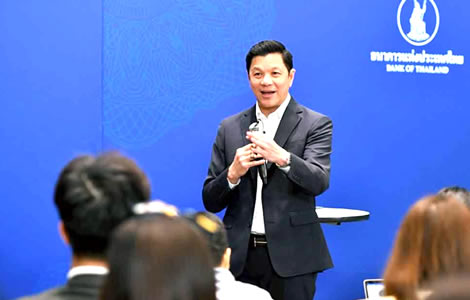Bank of Thailand fast-tracks household debt relief for 3 million borrowers with loans under ฿100,000, easing repayments in 2026. Governor Vitai says monetary policy alone won’t solve Thailand’s economic problems. He plans on using FIDF cuts to support vulnerable borrowers and thereby provide more liquidity in the economy.
The Bank of Thailand is fast-tracking household debt relief, targeting three million accounts with loans under ฿100,000. Governor Vitai Ratanakorn, on Friday, stressed that monetary policy alone cannot fix Thailand’s economic problems. Starting early next year, affected families will face lower monthly bank repayments, funded by a cut in the FIDF levy from 0.46% to 0.23%, in a tightly managed program to reduce household debt and ease financial pressure.

After chairing his first Monetary Policy Committee this week, the new Bank of Thailand Governor, Vitai Ratanakorn, is settling into his role. On Wednesday, the committee voted 5-2 to keep interest rates at 1.5%. This decision maintains Thailand’s position as having the third-lowest policy interest rate in the world.
However, analysts note that this figure does not account for fees and interest margins charged by the banking network. Some of these fees are paid to the government, helping support Thailand’s robust external finances.
One of Governor Vitai’s first priorities is household debt relief. Therefore, he is pursuing policies initiated by his predecessor and the previous government. These policies target millions of distressed loans, each under ฿100,000. To achieve this, the Bank of Thailand is rapidly establishing an Asset Management Company, or AMC, aiming to resolve debts for approximately two million accounts during the month of October.
Bank of Thailand will prioritise household debt relief and stabilise the economy by setting up a new AMC
Mr. Vitai emphasised that the Bank of Thailand’s future mission will continue to focus on long-term economic and financial stability. In addition, policies will be implemented independently, yet always within the legal framework.
Moreover, the central bank plans to expand collaboration with both public and private agencies to strengthen policy implementation. Coordinated efforts between monetary and fiscal authorities will be crucial to sustaining the economy and creating tangible structural solutions.
The household debt relief plan involves discussions with the Ministry of Finance, the Thai Bankers’ Association, and financial institutions. Specifically, Sukhumvit Asset Management Co., Ltd. (SAM) will act as the central AMC for the program.
Consequently, SAM will purchase loans from banks and other financial institutions to relieve vulnerable households. Initially, the program covers two million accounts. These include 700,000 accounts from commercial banks, 800,000 non-bank accounts under commercial banks, 300,000 accounts from state-owned banks, and accounts from general non-bank lenders.
Furthermore, the Bank of Thailand and Ministry of Finance are evaluating additional relief measures. These efforts follow two joint meetings to ensure coordinated action. The first measure is expected to assist around three million people with retail loans below ฿100,000. Mr. Vitai explained that the funds to purchase non-performing loans (NPLs) will come from the remaining funds of the “You Fight, We Help” project, which concluded on September 30.
Funding from commercial banks and the FIDF will support the Social AMC initiative to assist millions
These funds were contributed by commercial banks to the Financial Institutions Development Fund (FIDF) after the temporary remittance rate was reduced from 0.46% to 0.23%. Consequently, commercial banks are using the additional 0.23% to implement the Social AMC initiative through SAM.
Although the exact allocation of funds remains under discussion, negotiations are expected to conclude by the end of October. Mr. Vitai acknowledged that challenges remain, given the number of agencies involved. Nevertheless, he believes the measure will assist at least two to three million people and expects the initial implementation to be completed by early 2026.
The governor also emphasised that financial stability is central to the Bank of Thailand’s approach. Specifically, the bank will focus on low and stable medium-term inflation while preventing deflation.
Currently, core inflation—excluding volatile items such as energy and fresh food—stands at 0.9%. This indicates the economy continues to be supported by domestic demand, which remains close to 1%.
Core inflation and domestic demand show Thailand’s economy remains stable under central bank
Mr. Vitai further highlighted the resilience of Thailand’s financial institutions. Banks and financial institutions are capable of serving debtors, the public, and businesses without creating systemic vulnerabilities.
Additionally, the payment system remains secure, fast, convenient, and cost-efficient. These measures ensure the system meets the needs of households, businesses, and government operations alike.
Moreover, the governor confirmed that policy interest rates at 1.5% still leave room for further cuts. If necessary, rates can be lowered to support the economy or to manage inflationary pressures.
However, he stressed that monetary policy alone cannot drive economic recovery. Coordinated action with fiscal authorities and other agencies is required to address complex challenges. According to Mr. Vitai, this coordination is like solving a “jigsaw puzzle,” demanding precision and cooperation across institutions.
Interest rate flexibility and inter-agency coordination are essential to ensure effective economic recovery
The AMC initiative represents a key component of Thailand’s debt relief strategy. SAM will acquire distressed loans from both commercial and state-owned banks. This effort targets small-scale debtors, particularly those with retail loans below ฿100,000.
Consequently, vulnerable households will experience reduced financial pressure. At the same time, banks will benefit by clearing non-performing loans from their balance sheets.
Mr. Vitai also outlined the broader strategy behind these measures. Beyond debt relief, the central bank is pursuing structural solutions to enhance Thailand’s economic potential. Policies will be coordinated with public and private sector stakeholders to strengthen systemic resilience. Moreover, the central bank is committed to ensuring that financial institutions remain capable of managing risks while supporting economic growth.
The Monetary Policy Committee’s recent decision to maintain rates at 1.5% reflects careful consideration of domestic and global factors. Low interest rates help support households and businesses during periods of financial strain. At the same time, they signal that the central bank is prepared to act if inflationary or deflationary pressures increase. Furthermore, the decision highlights the Bank of Thailand’s commitment to proactive, evidence-based policy decisions.
AMC debt relief and structural reforms are designed to ease household pressures and maintain stability
The governor also emphasised that Thailand’s economic management requires ongoing vigilance. Monitoring household debt, banking sector stability, and inflation dynamics is essential.
In addition, the central bank will continue to coordinate with fiscal authorities to implement measures effectively. By combining monetary policy, debt relief, and structural interventions, Thailand aims to create a stable environment for growth.
The kingdom is indeed lucky to have a relatively benign inflation environment. The challenge for the central bank is to work with the various players in the banking network to achieve debt reduction arrangements without damaging financial stability. At the same time, the bank is mindful of creating a situation defined by moral hazard.
Mr. Vitai concluded that the Bank of Thailand is prepared to continue easing monetary policy if conditions require. This includes interest rate adjustments and other macroprudential tools.
Additionally, the governor stressed the importance of maintaining a resilient financial system capable of serving the economy efficiently. The central bank is committed to both supporting vulnerable households and ensuring the stability of institutions that underpin Thailand’s financial system.
Tight Asset Management Company (AMC) measures will strengthen finances and prevent systemic risks
The AMC’s implementation remains on a tight schedule. Coordination among the Bank of Thailand, the Ministry of Finance, commercial banks, and non-bank lenders is ongoing. The first wave of debt relief is expected to cover millions of small borrowers.
These measures are aimed at restoring household financial stability while strengthening the broader economy. Furthermore, the initiative is intended to prevent long-term systemic risks.
Finally, the central bank’s policies reflect a balanced approach. Maintaining low interest rates, supporting vulnerable households, and monitoring inflation are all critical elements.
Debt relief, low interest rates, and structural coordination combine to sustain growth and stabilise economy
At the same time, structural reforms and inter-agency coordination are essential to sustaining growth. Governor Vitai’s leadership emphasises decisive action, cooperation, and long-term resilience. The Bank of Thailand is focused on ensuring that both households and institutions can navigate current financial challenges effectively.
With this strategy, Thailand is positioned to manage both immediate and medium-term economic risks. Low interest rates, targeted debt relief, and strengthened institutional frameworks combine to support financial stability.
Year end jolt for the Thai economy as economists predict GDP growth at 2% or more for a difficult 2025
Bank of Thailand boss stresses stability taking up the reins with a new man at the Ministry of Finance
Dark days ahead for the economy despite a 1.8% GDP gain with ominous warning signs on employment
In addition, the central bank is prepared to respond to new economic developments quickly and efficiently. Mr. Vitai’s measures send a clear message: the Bank of Thailand will act decisively to protect the economy, support households and maintain financial stability.
Join the Thai News forum, follow Thai Examiner on Facebook here
Receive all our stories as they come out on Telegram here
Follow Thai Examiner here
Further reading:
Dark days ahead for the economy despite a 1.8% GDP gain with ominous warning signs on employment
Concern for US tariff deal as new Thai government shows enthusiasm for stronger links with Beijing
Thailand’s once mighty tourism industry is failing but now faces further damage from overvalued baht


















